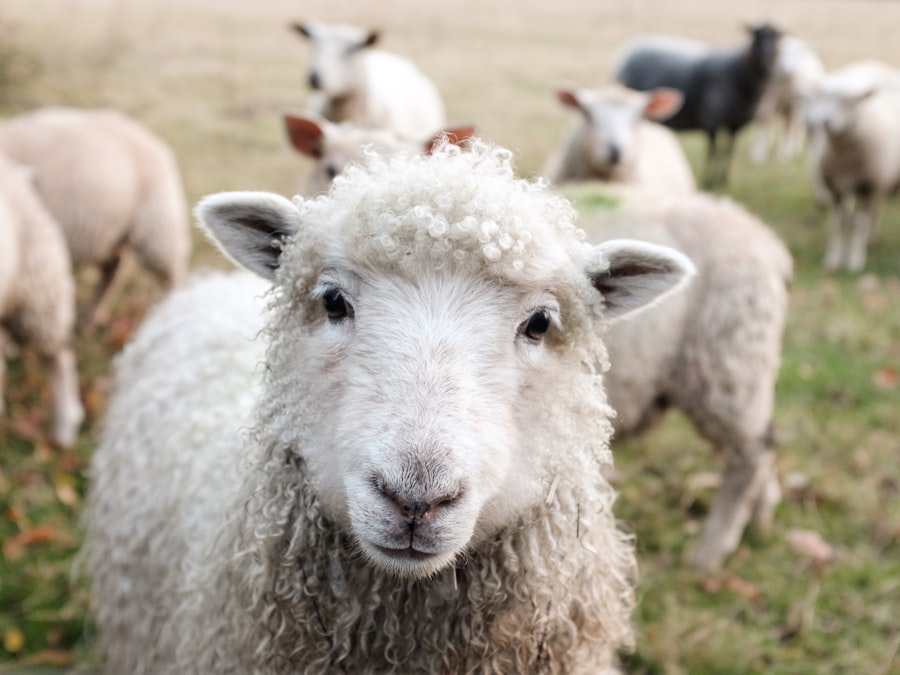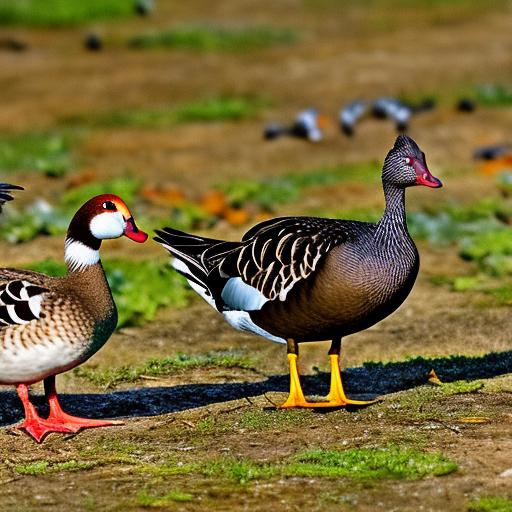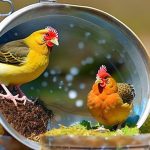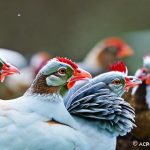Keeping ducks, chickens, and geese together in a coop is a popular practice among backyard farmers and homesteaders. These birds can coexist peacefully and provide numerous benefits to the flock and the farmer. However, there are also challenges that come with keeping these different species together. In this article, we will explore the compatibility of ducks, chickens, and geese, the benefits of keeping them together, factors to consider before introducing new birds to the flock, how to prepare the coop for their needs, and tips for managing the flock successfully.
Key Takeaways
- Ducks, chickens, and geese can be compatible and kept together in the same coop.
- Keeping these birds together can provide benefits such as pest control and increased egg production.
- Factors to consider before keeping them together include space, temperament, and dietary needs.
- Preparing the coop involves providing adequate space, nesting boxes, and water sources for all birds.
- Managing the flock requires monitoring for aggression and providing separate feeding areas for each species.
Understanding the Compatibility of Ducks, Chickens, and Geese
Ducks, chickens, and geese have different natural behaviors and characteristics that can make them compatible in a coop setting. Chickens are social animals that establish a pecking order within their flock. They are generally calm and docile but can become aggressive if they feel threatened or if there is competition for resources. Ducks are also social animals but tend to be more independent than chickens. They enjoy swimming and foraging for insects and plants. Geese are highly territorial and protective of their flock. They are known for their loud honking and aggressive behavior towards intruders.
Despite these differences, ducks, chickens, and geese can coexist peacefully in a coop if they are given enough space and resources. They can even form bonds with each other and provide companionship. Ducks and geese can help control pests in the coop by eating insects and slugs, while chickens can provide protection by alerting the flock to potential threats.
Benefits of Keeping Ducks, Chickens, and Geese Together
There are several advantages to keeping ducks, chickens, and geese together in a coop. One of the main benefits is pest control. Ducks and geese are excellent at eating insects and slugs that can be harmful to plants and crops. They can help reduce the need for chemical pesticides and provide a natural form of pest control. Additionally, chickens can help control pests by eating insects and worms.
Another benefit is egg production. Chickens are known for their egg-laying abilities, but ducks and geese can also lay eggs. By keeping all three species together, you can have a diverse range of eggs to enjoy or sell. Ducks and geese eggs are larger than chicken eggs and have a richer flavor.
Personal experiences and success stories from other backyard farmers also highlight the benefits of keeping ducks, chickens, and geese together. Many farmers have reported that their flock is healthier and happier when they are kept together. The different species provide companionship and entertainment for each other, which can reduce stress and improve overall well-being.
Factors to Consider Before Keeping Ducks, Chickens, and Geese Together
Before introducing new birds to the flock, it is important to consider several factors. First, you need to ensure that you have enough space to accommodate all three species. Ducks and geese require more space than chickens due to their larger size and need for swimming water. It is recommended to have at least 4 square feet per chicken, 10 square feet per duck, and 20 square feet per goose.
Breed compatibility is another factor to consider. Some breeds of ducks and geese are more aggressive than others and may not be suitable for keeping with chickens. It is important to research the temperament of different breeds before introducing them to the flock.
Temperament is also an important consideration when introducing new birds to the coop. It is best to introduce new birds gradually and monitor their behavior closely. If there is aggression or bullying, it may be necessary to separate the birds temporarily until they can coexist peacefully.
Preparing the Chicken Coop for Ducks, Chickens, and Geese
To accommodate ducks and geese in a chicken coop, some modifications may be necessary. Ducks and geese require a water source for swimming, so a small pond or shallow pool should be provided. A ramp or platform can be added to allow easy access to the water. It is important to keep the coop clean and dry to prevent the buildup of moisture, which can lead to health issues for the birds. Regular cleaning and bedding changes are essential.
Designing a Coop Plan that Accommodates Ducks, Chickens, and Geese

When designing a coop plan that accommodates ducks, chickens, and geese, it is important to consider their specific needs. The coop should have areas for roosting, nesting, and swimming. Roosting bars should be provided at different heights to accommodate the different sizes of birds. Nesting boxes should be accessible and comfortable for all three species. A separate area with a water source should be designated for ducks and geese to swim.
It is important to customize the coop plan to fit your specific needs and space limitations. The size of the coop will depend on the number of birds you plan to keep. Adequate ventilation and natural light should also be considered when designing the coop.
Feeding Ducks, Chickens, and Geese in the Same Coop
Ducks, chickens, and geese have different dietary needs, so it is important to provide a variety of food options in the coop. Chickens require a balanced diet of grains, protein, fruits, and vegetables. Ducks need a higher protein diet and can be fed a combination of poultry feed and fresh greens. Geese require a diet high in grass and forage.
To feed them together, separate feeding stations can be set up to ensure that each bird gets the appropriate food. This can help prevent competition and aggression during feeding time. It is also important to provide fresh water at all times for all three species.
Managing the Flock: Tips for Keeping Ducks, Chickens, and Geese Together
Managing the flock requires monitoring their behavior and providing adequate space. It is important to observe the birds regularly to ensure that there is no aggression or bullying. If any bird is being excessively aggressive, it may be necessary to separate them temporarily.
Providing enough space is crucial for the well-being of the flock. Overcrowding can lead to stress and aggression. It is recommended to have at least 10 square feet per duck and 20 square feet per goose to ensure that they have enough room to move around comfortably.
Keeping the coop secure is also important to prevent predators from attacking the birds. The coop should be made of sturdy materials and have secure fencing to keep out predators such as raccoons, foxes, and dogs. Regular inspections of the coop and fencing should be done to ensure that there are no weak spots or gaps.
Common Challenges of Keeping Ducks, Chickens, and Geese Together and How to Overcome Them
Keeping ducks, chickens, and geese together can come with its challenges. One common challenge is aggression between the different species. This can be overcome by providing enough space and resources for each bird. If aggression persists, it may be necessary to separate the birds temporarily until they can coexist peacefully.
Another challenge is disease transmission. Ducks and geese are more resistant to certain diseases than chickens, but they can still carry and transmit diseases. It is important to practice good biosecurity measures, such as regular cleaning and disinfection of the coop, proper waste management, and quarantine procedures for new birds.
If you encounter any challenges or issues with keeping ducks, chickens, and geese together, it is recommended to seek advice from other backyard farmers or a veterinarian who specializes in poultry health.
Enjoying the Benefits of Keeping Ducks, Chickens, and Geese Together in a Coop
Keeping ducks, chickens, and geese together in a coop can provide numerous benefits, such as pest control and egg production. With proper planning and management, these different species can coexist peacefully and provide companionship and entertainment for each other. By considering factors such as space, breed compatibility, and temperament, and making necessary modifications to the coop, you can create a harmonious environment for your flock. Enjoy the benefits of keeping ducks, chickens, and geese together and share your experiences with others in the backyard farming community.
If you’re interested in keeping ducks, chickens, and geese together, you may also find the article on “Do Turkeys Need a Coop?” from Poultry Wizard informative. This article discusses the housing requirements for turkeys and provides insights into creating a suitable coop for them. Understanding the different needs of various poultry species can help you design a coop that accommodates ducks, chickens, geese, and even turkeys harmoniously. To learn more about turkey coops, click here.
FAQs
What are the benefits of keeping ducks, chickens, and geese together?
Keeping ducks, chickens, and geese together can provide a variety of benefits, including pest control, fertilization of the soil, and a diverse range of eggs and meat.
What are the potential drawbacks of keeping ducks, chickens, and geese together?
The potential drawbacks of keeping ducks, chickens, and geese together include the risk of disease transmission, aggression between different species, and the need for adequate space and resources.
What should I consider before keeping ducks, chickens, and geese together?
Before keeping ducks, chickens, and geese together, you should consider the space and resources available, the compatibility of the different species, and the potential risks and benefits.
What are some tips for keeping ducks, chickens, and geese together?
Some tips for keeping ducks, chickens, and geese together include providing adequate space and resources, monitoring the animals for signs of aggression or illness, and separating any animals that are not compatible.
What are some common breeds of ducks, chickens, and geese that can be kept together?
Some common breeds of ducks, chickens, and geese that can be kept together include Pekin ducks, Rhode Island Red chickens, and Toulouse geese.
What are some signs that ducks, chickens, and geese are not compatible?
Some signs that ducks, chickens, and geese are not compatible include aggression towards each other, stealing food or resources from each other, and not sharing the same living space peacefully.
Meet Walter, the feathered-friend fanatic of Florida! Nestled in the sunshine state, Walter struts through life with his feathered companions, clucking his way to happiness. With a coop that’s fancier than a five-star hotel, he’s the Don Juan of the chicken world. When he’s not teaching his hens to do the cha-cha, you’ll find him in a heated debate with his prized rooster, Sir Clucks-a-Lot. Walter’s poultry passion is no yolk; he’s the sunny-side-up guy you never knew you needed in your flock of friends!







